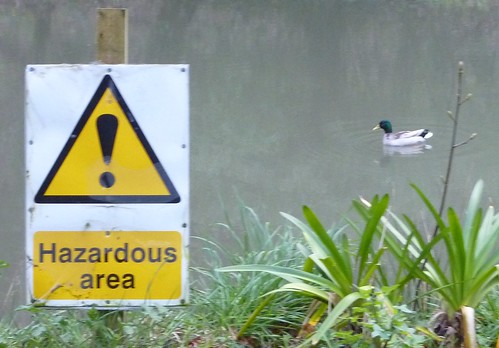Hazardous environments: I like to think of this as being a metaphor for any situation in which one is challenged.
Read More9 Challenges of Project-Based Learning
Hazardous Environments
I was working in Jersey last week, and came across this sign.
 OK if you're a duck...I like to think of this as being a metaphor for any situation in which one is challenged. It may be a conference, or it may be a small gathering of friends or colleagues (I use the word 'or' in the Boolean sense). It may be a new assignment, or a new team to manage, or a new boss. It may be a new syllabus, or a new piece of software. It may be a new government initiative. Or it may be a failure to launch a new government initiative.
OK if you're a duck...I like to think of this as being a metaphor for any situation in which one is challenged. It may be a conference, or it may be a small gathering of friends or colleagues (I use the word 'or' in the Boolean sense). It may be a new assignment, or a new team to manage, or a new boss. It may be a new syllabus, or a new piece of software. It may be a new government initiative. Or it may be a failure to launch a new government initiative.
It seems to me that what keeps good educationalists interested, and therefore interesting, is continually venturing into 'hazardous areas'. Where old assumptions and current paradigms no longer work, and long-honed skills lack relevance.
Involvement in educational ICT has its own challenges. There is the obvious one, that of constantly having to learn about, and learn how to use, new applications. But there is a curricular and assessment challenge too, which is more subtle. As new developments make certain things easier to achieve, it becomes untenable to give credit for achieving them, from a skills point of view.
A good example of this is desktop publishing. My first desktop published page took me about an hour and a half to achieve, as I figured out what I had to do. Once 'wizards' and templates had been introduced, by Microsoft Publisher, the same task took little longer than it took to enter the text. What was once a highly-skilled operation suddenly became almost unskilled.
This is reflected in several national ICT curricula I have looked at: as the grade level rises, the skills required rise less quickly. In fact, I would argue that in the English National Curriculum for ICT, there are hardly any more skills to learn beyond Level 4. You can achieve Level 8 with not much more than a Level 4 skill set, in my opinion. Why? Because the further up the ladder you go, the more important become factors like feedback (and therefore iteration) and systematic (strategic) thinking.
In this context, talk of digital natives or cool tools is not especially helpful. The real issue is that one must be continually finding new challenges for youngsters. Challenges which:
- Make use of their current technical skills but nudge them towards the next level;
- Are relevant to them personally in some way;
- Are problems to be solved;
- Excite both them and their teachers;
- Are not easy; ...
- ... Yet are not so difficult as to make one want to give up;
- Have many facets;
- Encourage collaboration; ...
- ... And friendly rivalry;
- Cannot be assessed by a tick list.
I often hear people bemoan the fact that ICT lessons are boring, and then proceed to blame the National Curriculum. I think the National Curriculum is broad and flexible enough to cope with modern demands -- where people actually make them.
That to me is the real problem: that for all sorts of understandable reasons many teachers do not make real demands of their students. They provide them with intellectually safe, and therefore boring, environments.
They should be providing intellectually hazardous ones.
The 30 Goals Challenge
#30goals When a long-time subscriber to my newsletter, Computers in Classrooms, emailed me to ask if I could recommend a blogger she should follow, I had no hesitation: Shelly Terrell, without a doubt.
Seemingly indefatigable, Shelly writes an amazing amount of stuff, all of which is high quality. Following her on Twitter is good for one’s professional development in itself, but her blog, Teacher Reboot Camp, is definitely worth a visit.
And worth subscribing to.
At the moment, Shelly is writing a series in which she is setting a new challenge every day for 30 days. Known as the Goals 2010 Challenge Series, this is an excellent set of posts that are:
- Challenging
- Replete with resources
- Well-written
The upbeat tone of the articles, together with their good advice and questioning, serve to remind us of the sheer excitement of working in education.
I have to say I find some of the posts a bit long, so I tend to speed-read them much of the time. That’s not a criticism actually. I prefer long posts sometimes because I like something I can get my teeth into. Besides, Shelly often formats her articles in such a way (ie with bullet points and suchlike) that reading them quickly is not difficult.
I love her challenge about causing a ripple. In fact, I love the idea of this sort of series, and will be starting one myself soon, on a different topic. I’ve been intending to do it for ages, but have been waiting for the right time. Inspired by Shelly, I’ve now decided to start writing it while I’m waiting for the right time!
Another series you might like is Steve Dembo’s 30 Days to be a better blogger.
But check Shelly’s out first ;-)
